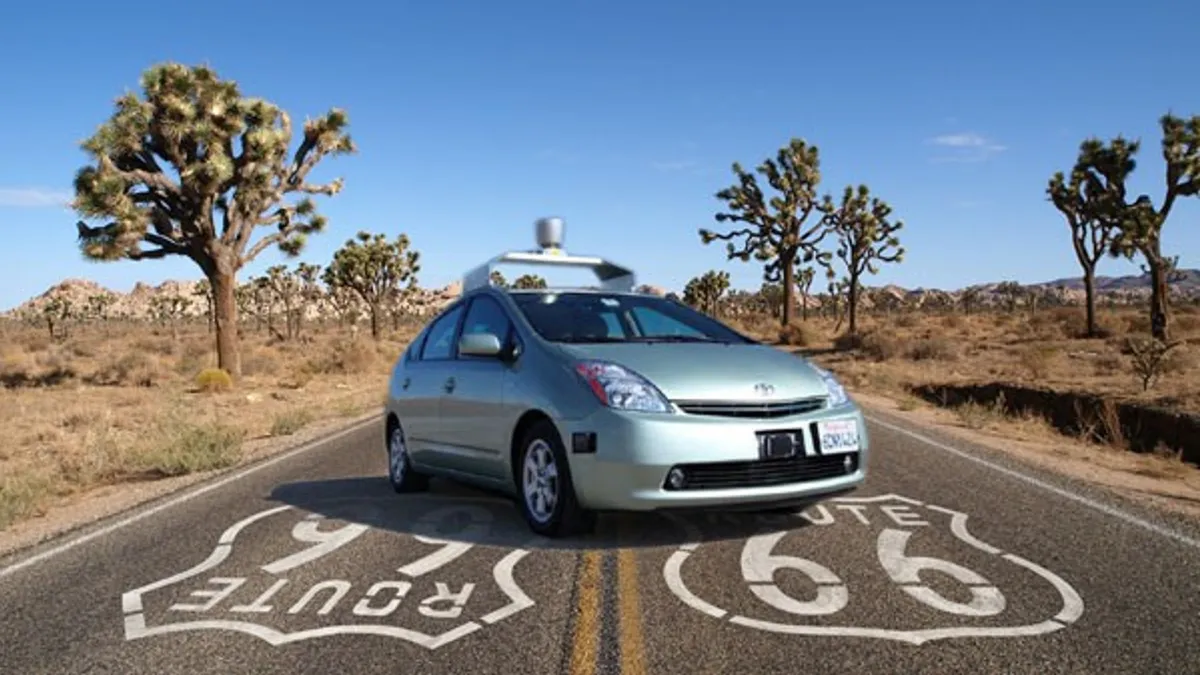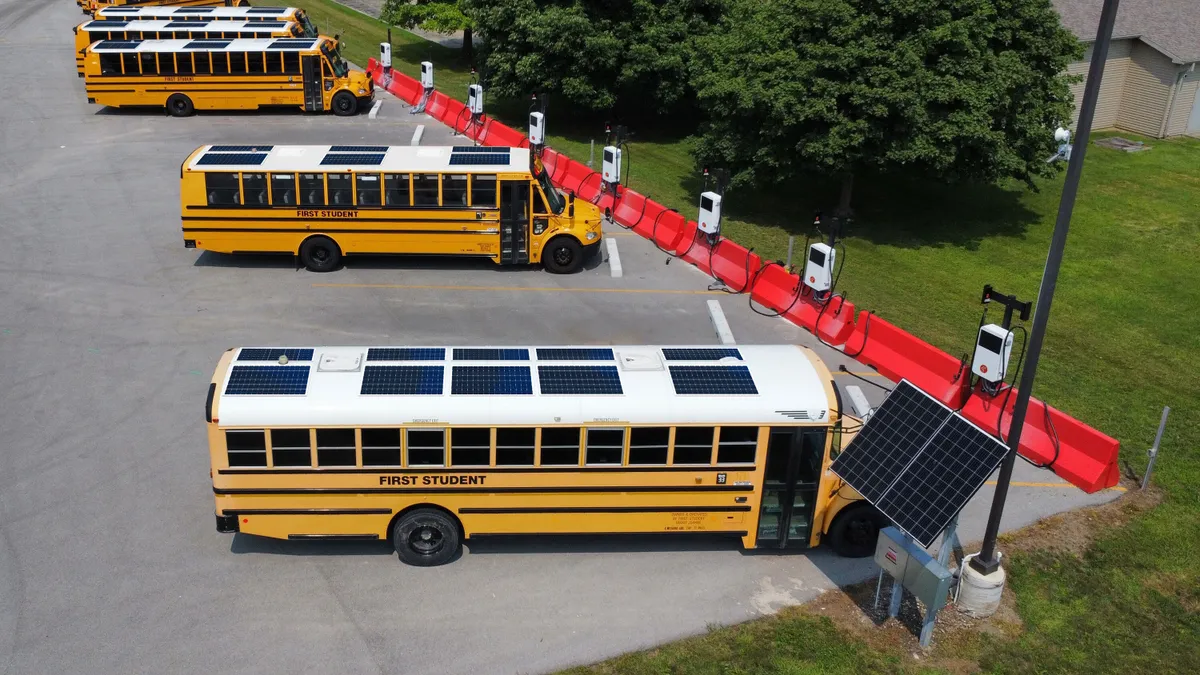Driverless vehicles are no longer the innovation of the future. They're the innovation of now.
Just this month, New York and Georgia joined Alabama, Arkansas, California, Florida, Louisiana, Michigan, Nevada, North Dakota, Pennsylvania, Tennessee, Utah, Virginia and Washington D.C. to put autonomous vehicle laws on the books. The governors of Arizona and Massachusetts have also issued executive orders on autonomous vehicles.
All of these laws currently require humans in the driver seat, but that could change in California as the DMV considers a new law for fully autonomous vehicles. Virginia is also opening an Autonomous Technology Center with a goal of accelerating innovation around driverless cars. Virginia’s governor wants to make his state "the capital of automated vehicles."
Cities also play a huge role in the rollout of driverless cars. During a talk about preparing for autonomous vehicles during the recent Infrastructure Week, panelists agreed the federal government has a role in setting policy so there aren’t 50 disparate laws on autonomous vehicles, but that much of the testing and other infrastructure changes should be done at state, regional and city levels.
"It’s how we let good ideas bubble up, that’s how we find out about bad ideas," said Adie Tomer, a fellow at the Brookings Institution Metropolitan Policy Program. "We are going to have a lot more worst practices here than best practices."
A report from National League of Cities looked at long-term transit plans of 68 large cities and found that only 6% addressed self-driving. But, more cities are starting consider. Here are a few cities with different testing projects that are helping to lay the groundwork for a future of autonomous vehicles.
Portland, OR
Portland is one of few cities trying to adopt autonomous vehicles before state policy is set. While Oregon considered legislation in the past, it did not succeed.
"Our take on Oregon law is that autonomous vehicles are on frustrating ambiguous territory, frustrating for the industry and frustrating for us," said Dylan Rivera, spokesman for Portland Bureau of Transportation.
Mayor Ted Wheeler announced a directive that included a request for information in April and Rivera said that they are hoping to have testing happen in 2017. Portland may financially support testing projects that would help public transit, like getting people from bus stops to work in industrial East Portland or running shuttles to the airport.
"We see a potential of public good to improving public transit," Rivera said.
The city would also consider allowing ride-sharing or automobile companies that wanted to come in use areas of Portland to test autonomous vehicle technology.
"Our take on Oregon law is that autonomous vehicles are on frustrating ambiguous territory, frustrating for the industry and frustrating for us."

Dylan Rivera
Spokesman, Portland Bureau of Transportation
Los Angeles
Last year, Los Angeles released a report titled Urban Mobility in the Digital Age, a roadmap for the city’s transportation future. The report considers autonomous vehicles in Los Angeles but takes a holistic view, looking to bike shares and an expanded metro for how the city could change its famous car culture. Already, Angelenos did adopt Uber and Lyft quickly, proving residents are open to giving up their cars.
The Port of Los Angeles implemented autonomous vehicles last year but no other current testing is going on. The LA Department of Transportation has identified potential closed course areas for future testing, including Palms airport and UCLA and USC. If self-driving car companies think their technology can handle open traffic, the U.S. Department of Transportation (DOT) has ideas for those areas, too. Besides car culture, Los Angeles has a sheer amount of variation of infrastructure that could make it an ideal (but difficult) city to test. The downtown is urban with heavy construction, walkers and bikers, and freeways. There are also rural areas east of the city center where you have equestrian trails.
The most famous project, however, might be Elon Musk’s plans to have a Tesla drive itself from Los Angeles to New York sometime this year.
Boston
In April, Boston gave approval for the Cambridge-based autonomous vehicle startup nuTonomy to test on more roadways, a few months into the start of a pilot program.
Boston is in an envious position of having multiple world class universities and colleges nearby that are engaging in research. NuTonomy, which is also testing vehicles in Singapore, is actually an MIT spin-off technology company.
"We really think that using and capitalizing academic institutions is why Boston is on the map for moving this technology forward," said Kristopher Carter, co-chair of the mayor's office of new urban mechanics.
But the city itself is doing its share. The Go Boston 2030 Vision and Action Plan was released in March and details what the city would like its transportation future to look like. The city spoke with thousands of residents, community groups and stakeholders to shape the document. Boston was also chosen as the lead partner city for the World Economic Forum's City Challenge, an initiative that is supporting cities designing the future of urban mobility.
"We really think that using and capitalizing academic institutions is why Boston is on the map for moving this technology forward."

Kristopher Carter
Co-chair, Mayor's office of New Urban Mechanics
Las Vegas
Las Vegas recently completed a small autonomous shuttle test, covering three blocks in downtown Las Vegas. In 10 days, the shuttle had 10,000 riders.
“It was a very big success,” said David Bowers, the director of Public Works. “There was a lot of excitement about it.”
The city is considering another shuttle test and is investing in fiber for traffic signals so dedicated short range communications (DSRC) technology can be used in the future to talk with autonomous vehicles.
Las Vegas is also innovating for the rest of its transportation infrastructure. Besides creating a mobility master plan, the city recently hosted a hackathon where participants worked on a project to determine whether the street lights were working properly, checking to see if meters are drawing the right amount of power. They also worked on an app for Amazon's Alexa to check if the lights are using the right amount of energy.
Pittsburgh
Uber picked Pittsburgh as its first autonomous vehicle testing ground in September, but the lessons learned in this Rust Belt city have not all been good. Uber has been unwilling to share the data collected with Pittsburgh. The company also began charging for driverless rides that were initially advertised as free, and the 675 jobs Uber promised have not come through.
Uber also did not end up supporting Pittsburgh’s application for a $50 million federal grant from the U.S. Department of Transportation (DOT), which Columbus went on to win.
Luckily, Pittsburgh has more than Uber to rely on. Aurora, a self-driving car startup, recently drove a test car from Silicon Valley to Pittsburgh and set up an office there. Delphi, another self-driving car company, also recently setup shop. Argo AI, a startup in which Ford recently invested $1 billion, is headquartered in Pittsburgh and working on a driving system for autonomous vehicles that Ford wants on the road by 2021. Carnegie Mellon University also has a world class robotic program, all of which proves the Steel City will be a leader in autonomous vehicles with or without Uber.
Sacramento, CA
Less than two hours from Silicon Valley, Sacramento is trying to draw autonomous vehicle testing to its streets.
A group of policymakers from local, state and federal government, as well as representatives from private industry, created the Autonomous Transportation Open Standards Lab (ATOS). The group hopes to provide guidance and encourage local testing.
In a Medium post, Vivek Ranadive, owner of the Sacramento Kings and one of ATOS founders, wrote that ATOS is the first organization in the U.S. to speed up autonomous vehicle development.
"We are creating the HTTP of autonomous vehicles — an open source platform that ensures city governments and private companies have a standardized and interoperable platform to build upon," Ranadive wrote.
In an interview with Government Technology, the ATOS founders call Sacramento a great place to deploy autonomous vehicles, with a grid that is good for testing, a proximity to state regulators and support from residents.
Sacramento is also one of the 5G pilot cities for Verizon, a technology that can help the vehicles communicate faster and drive smarter.
"We are creating the HTTP of autonomous vehicles — an open source platform that ensures city governments and private companies have a standardized and interoperable platform to build upon."

Vivek Ranadive
Co-founder, Autonomous Transportation Open Standards Lab
Arlington, TX
The U.S. DOT selected Arlington as one of 10 cities across the country for autonomous vehicle testing earlier this year. Arlington was once the largest U.S. city without a comprehensive public transit system, but it has recently started to address that with a bus system. Now, the city council approved a driverless shuttle service to start in June. The six month pilot project will use shuttles that can carry 12 passengers and start on fixed courses without street traffic.
The shuttles are in Arlington’s Entertainment District, which contains the Texas Rangers’ Globe Life Park and the Dallas Cowboys’ AT&T Stadium. The University of Texas at Arlington campus and Interstate 30 are two other locations in Arlington that the city plans to try out autonomous vehicle projects.



















